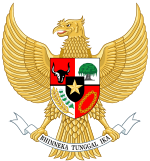
Pancasila economics (Indonesian: Ekonomi Pancasila), also known as "Indonesian populist economics" (Indonesian: Ekonomi kerakyatan Indonesia), is an economic system which aims to reflect the five principles of Pancasila. The term "Pancasila economy" first appeared in an article by Emil Salim in 1967. Mubyarto is one of the staunchest of the Pancasila economic theorists.
In essence, a Pancasila economy is a system that tries to avoid pendulum-like swings from one extreme (a free market economy, known in Indonesia as free fight liberalism) to the other (state socialism, especially of the Soviet kind). In simple terms, a "Pancasila economy" can be described as a market economic system with government control or a controlled market economy. A Pancasila economy can be considered an example of a mixed economy or a third way economic system.
A Pancasila economy is seen as a counterbalance to a neoclassical approach promoting individualism and free markets that is adapted the values of Indonesian society, including religious values, culture, customs and norms.
The concept of Pancasila economics was first conceived in the early days of the New Order as part of the regime's De-Sukarnoization and "cleansing of Communist, 30 September Movement and PKI remnants from Pancasila" which was aimed for what the regime claim as a "return into a pure, consequential Pancasila".
Characteristics
The Pancasila economic system is based on Article 33 of the Indonesian constitution. The article calls for "collective enterprises under the principle of 'familyism' (Indonesian: kekeluargaan)", which is meant to be implemented through cooperatives, the state control of the commanding heights of the economy and of land and resources.
The five basic characteristics of the economic concept of Pancasila are:
- Cooperative development
- Commitment to equity
- Nationalist economic policy
- Centralized planning
- Decentralized implementation
The Pancasila economic system is claimed to have superiority above liberalism. Theorists claim it as "an economic system for the common people". Pancasila economic theorists also argue the system's superiority over socialism, which they claim do not recognize "individual ownership" (Indonesian: kepemilikan pribadi; the term "pribadi" is an Indonesian homonym for both "private" and "personal").
There has been much discussion about the need for a Pancasila economic system in economic development policy in Indonesia since Indonesian independence in 1945.
The principles of a Pancasila economy were mandated by the Indonesian Constitution in 1945. These include humanitarianism, economic nationalism, economic democracy and justice.
See also
References
- "Macam dan Pengertian Sistem Ekonomi". www.ekonoomi.com. Archived from the original on 29 April 2014. Retrieved 15 May 2014.
- ^ Prof. Dr. Dawam Rahardjo. "Analisis Pancasila sebagai Filosofi Perekonomian". www.ekonomikerakyatan.ugm.ac.id. Retrieved 15 May 2014.
- Mubyarto 2002, p. 68. sfn error: no target: CITEREFMubyarto2002 (help)
- ^ "Membumikan Sistem Ekonomi Pancasila". pelitaonline.com. Archived from the original on 23 May 2014. Retrieved 15 May 2014.
- ^ "Prof Mubyarto dan Ekonomi Pancasila". poskotanews.com. Archived from the original on 27 April 2014. Retrieved 15 May 2014.
- ^ "Pancasila needs to be implemented a system to economic". www.antaranews.com. Retrieved 15 May 2014.
Further reading
- R. William Liddle. 1982. 'The Politics of Ekonomi Pancasila', Bulletin of Indonesian Economic Studies, XVIII (1), March, pp. 96–101.
- Peter McCawley. 1982. 'The Economics of Ekonomi Pancasila', Bulletin of Indonesian Economic Studies, XVIII (1), March, pp. 102–109.
- Dumairy & Tarli Nugroho. 2014. Ekonomi Pancasila: Warisan Pemikiran Mubyarto . Yogyakarta: Gadjah Mada University Press.